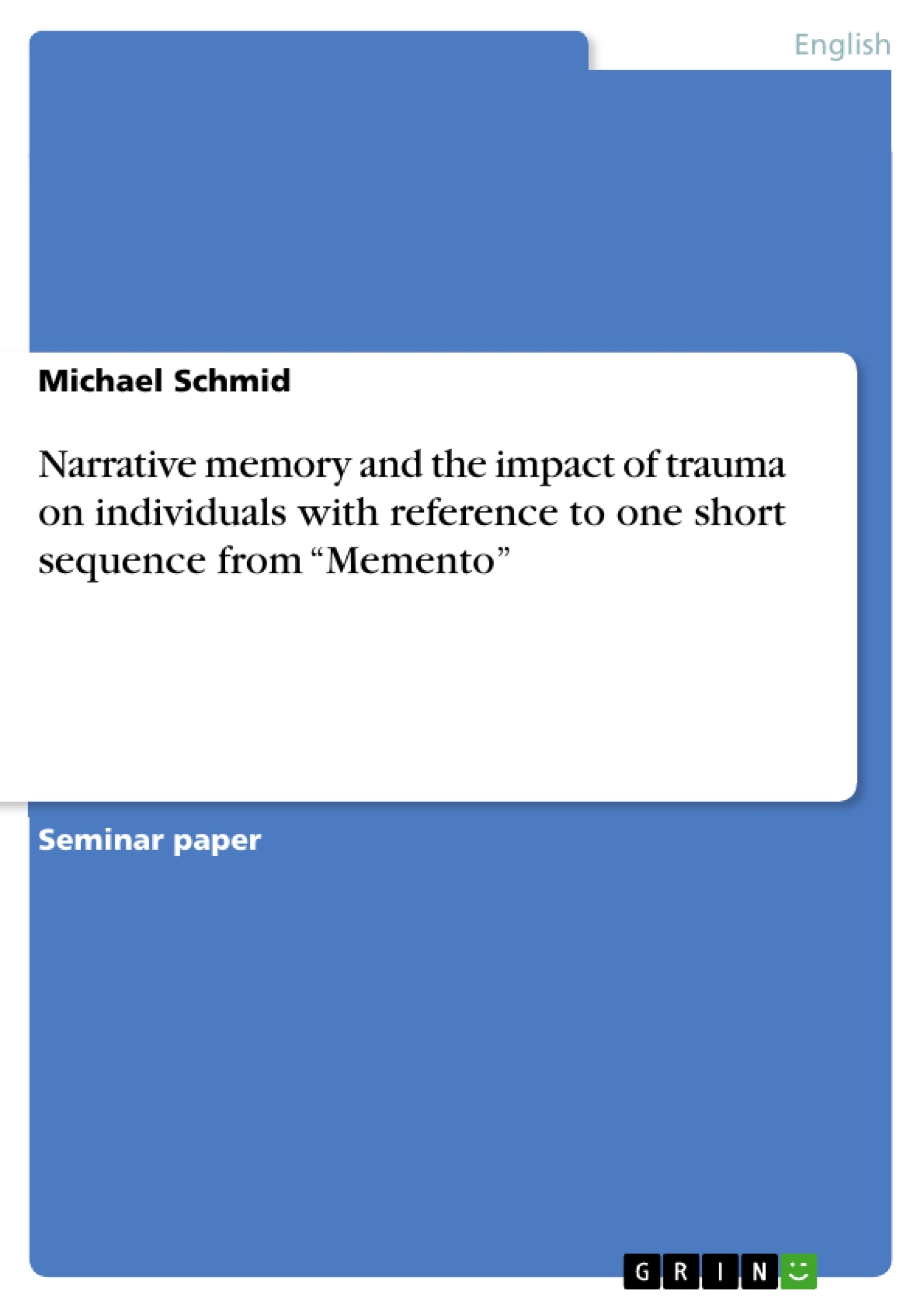The text by Bessel Van der Kolk and Onno Van der Hart “The Intrusive Past” provides an overview of the work and achievement of Jean – Martin Charcot´s and Pierre Janet’s study about how the mind processes memories and the effects of traumatic memories on consciousness.
With the following text, I will present a couple of central aspects of Janet’s study and the phenomena of dissociation and the reconstruction of the past through narrative memory and project them onto one short sequence from “Memento” (2001) to further support my argument. The main point of this text is to illustrate how narrative memory reshapes the past in a variety of ways and that the main character in “Memento”, who has lived through a traumatic experience, creates and recreates his past through the means of a combination of the already mentioned dissociation and narrative memory.
Janet considered “the memory system as the central organizing apparatus of the mind, which categorizes and integrates all aspects of experience and automatically integrates them into ever – enlarging and flexible meaning schemes.” He differentiates between the subconscious automatic integration of familiar and expectable experiences into existing meaning schemes and the difficult integration of frightening and novel experiences, which might either totally resist integration or be remembered extremely vivid. The subconscious integration of memories occurs because they fit easily into the meaning scheme, they do not pose a threat or form a contradiction to the already existing beliefs, values and meanings of the world.
Whereas the automatic integration of new information happens without conscious attention, the narrative memory is something very deliberate and conscious. Narrative memory is not the act of remembering something that happened in the past but an act of recreating the past, of changing the memory. Janet explains this phenomena as mental constructs, “which people use to make sense out of experience.” This suggests that the individual’s existing meaning schemes may be entirely unable to integrate a specific terrifying experience, which causes the memory to be stored differently, and therefore might not be available for the act of remembering.
Table of Contents
- Narrative Memory and the impact of Trauma on individuals
- The Impact of Trauma on Memory
- Janet's Study of Dissociation and Narrative Memory
- Dissociation and Traumatic Memory
- The Narrative Memory in "Memento"
Objectives and Key Themes
The text explores the impact of trauma on individual memory and consciousness, using the work of Jean-Martin Charcot and Pierre Janet as a framework. It aims to demonstrate how narrative memory and dissociation influence a trauma survivor's perception and reconstruction of the past. The text then applies this theoretical understanding to a specific scene from the film "Memento."
- The role of narrative memory in processing and reconstructing traumatic experiences
- The concept of dissociation as a defense mechanism against overwhelming trauma
- The impact of trauma on memory and the formation of false memories
- The relationship between trauma and identity formation
- The use of cinematic techniques in "Memento" to depict the effects of trauma on memory
Chapter Summaries
- This chapter introduces the work of Jean-Martin Charcot and Pierre Janet, focusing on their studies of how the mind processes memories, particularly traumatic ones. It highlights Janet's concept of narrative memory as a conscious act of recreating the past, often through the creation of false memories.
- This chapter delves into the concept of dissociation as a defense mechanism against traumatic experiences. It discusses how dissociation can lead to individuals experiencing events as if they were happening to someone else, ultimately separating themselves from their own traumatic memories.
- This chapter compares and contrasts the ideas of repression and dissociation. It highlights Janet's argument that dissociation occurs during the traumatic event itself, making deliberate repression afterwards unlikely. It also provides examples of how dissociation can manifest in trauma survivors, including the development of multiple personalities.
- This chapter introduces the film "Memento" and its central character, Leonard Shelby, who suffers from short-term memory loss. It discusses the film's unique structure and how it parallels Leonard's experience of fragmented memory.
Keywords
This text focuses on the concepts of narrative memory, dissociation, traumatic memory, and the impact of trauma on identity and consciousness. It explores how these concepts relate to the work of Jean-Martin Charcot and Pierre Janet and examines their application in the film "Memento." The text also touches on the idea of active repression and the psychological phenomenon of short-term memory loss.
- Quote paper
- Michael Schmid (Author), 2004, Narrative memory and the impact of trauma on individuals with reference to one short sequence from “Memento”, Munich, GRIN Verlag, https://www.grin.com/document/66502



